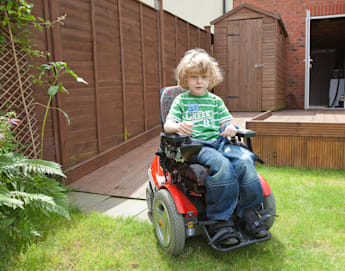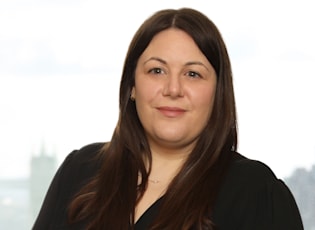We have helped thousands of people recover maximum damages in all areas of medicine. We have likely already pursued a case similar to yours. Search by hospital or medical condition to find a relevant case study.
Medical negligence encompasses serious injury following negligent medical care or misdiagnosis, including catastrophic injury to children during birth.
If you have been affected by negligence, our team of award-winning solicitors can react quickly and sympathetically to guide you through the process of making a claim.
Led by top-tier partner Iona Meeres-Young, our solicitors work closely with you to ensure you receive maximum compensation to help rebuild your life.
Find out more about making a medical negligence claim.
Recent cases
Browse our recent medical negligence cases.
Head and shoulders above every other team in the country. It is a superbly led team with deep experience and fantastic resources which is repeatedly successful.
First class, with an exceptional degree of empathy and understanding.
Latest news and insights
Read the latest news and insights from our medical negligence team.
Frequently asked medical negligence questions
Clinical negligence, also referred to as medical negligence, is where someone suffers an injury due to a medical professional or organisation providing inadequate medical care. This could be treatment given by a GP, an NHS or private doctor or other healthcare professional.
If you have been injured as a result of negligent medical treatment, you may be able to take legal action for compensation.
You can also take action for someone who has been injured but does not have the legal capacity to pursue a claim themselves, for example, a child or anyone who does not have the mental capacity.
You may also be able to seek compensation where a family member has died as a result of negligent treatment.
Medical negligence, also referred to as clinical negligence, is where you have suffered an injury due to a medical professional or organisation providing inadequate medical care. This could be treatment given by a GP, an NHS or private doctor or other healthcare professional.
If you have been injured as a result of negligent medical treatment, you may be able to take legal action for compensation.
You can also take action for someone who has been injured but does not have the legal capacity to pursue a claim themselves, for example, a child or a person who does not have the mental capacity.
You may also be able to seek compensation where a family member has died because of negligent treatment.
- Delay in diagnosing a condition
- Failure to diagnose a condition
- An error during surgery
- Errors during childbirth
Medical negligence claims can lead to a wide range of injury from relatively mild injuries where a person enjoys full recovery, to serious and complex injuries that can be life-changing and seriously debilitating.
Types of claim include:
- cerebral palsy
- brain injury (adults and children)
- spinal and neck injury
- amputation of limbs
- neurological injury
- wrongful birth claims (where a seriously disabled child has been born following negligent antenatal care)
- surgical errors
- misdiagnosis of conditions
- delay in diagnosing cancer
- orthopaedic claims
Compensation can be awarded for the pain, suffering and loss of amenity you have experienced as a result of negligent medical treatment. You can be compensated for both a physical and psychological injury.
You can also be awarded compensation to cover expenses incurred as a result of your injury. Compensation will also include expenses you are likely to incur in the future due to your injury.
Examples include:
- Loss of earnings
- Cost of medical treatment
- Aids and equipment
- Care or assistance
- Alternative and/or adapted accommodation
- Therapies such as physiotherapy, occupational therapy and speech and language therapy
- Assistive technology
Yes. Generally, there is a three-year time limit to bring a claim. However, it is always advisable to bring a claim as soon as possible.
The three year time limit runs from either:
- the date that the negligent treatment occurred; or
- the date when you became aware you suffered a significant injury from negligent treatment
Yes. The time limit is different for a child or a person without mental capacity to pursue a claim.
Children: You can bring a claim on behalf of a child at any point until they are 18. Once 18, the child can bring their own claim. The three- year time limit only starts to run from when a child reaches their 18th birthday and therefore expires when they reach 21 years of age.
Adults without capacity: there is no time limit where a person lacks capacity to bring their own claim. You can claim on their behalf at any time.
Fatal claims: if a loved one has died, there is also a time limit within which to bring a claim. This is generally three years from the date of their death. There are exceptions to this time limit if the deceased was aware they had suffered a significant injury from negligent treatment before they died. We advise you to speak to a solicitor as soon as possible.
Find out more about medical negligence claims time limits.
Yes, if you have suffered a significant injury due to a failing in the standard of medical care provided by a healthcare professional then you are able to make a claim for compensation.
Medical negligence claims are serious and you can be awarded compensation for the injury you have suffered. Bringing a claim can also help prevent a similar mistake happening to another patient.
If you are unsure whether you can bring a medical negligence claim, please contact one of our specialist lawyers who will be able to deal with your enquiry.
A claim can be brought on behalf of a child by a parent or guardian. We represent many children in their claims for compensation for negligent medical treatment.
We will pursue your child's case by taking your instructions on their behalf (and with your child's wishes if they are old enough to express a view). We will provide you with our advice and experience to support you in making any decisions on their behalf.
Any settlement reached on behalf of a child will be approved by a judge in court to ensure that it is in the child's best interests.
All you need to do is contact us. We are experts in medical negligence cases and will advise and support you throughout the process and ensure that you get the best possible outcome.
Find out more about how to make a medical negligence claim.
We aim to settle your claim as quickly as possible while ensuring you recover the compensation you are entitled to. Each case is different and there is no set time for when a case can be concluded.
More complex cases, which often involve serious, life-changing injury, can take longer. In some cases, it is advisable to wait before settling because the long-term impact of the injury or condition is not yet clear. Where possible, we will obtain part payment of your compensation while the claim is ongoing so that rehabilitation can begin, such as therapies and medical treatment or to provide equipment and adapted accommodation.
Evidence that can support your medical claim includes:
- copies of your GP and hospital records, which we will obtain for you
- your statement to detail your own account of events
- statements from family and friends
Expert reports are also obtained. We will instruct independent medical experts to consider the records and your statement. An expert will provide a report commenting on the care you received and whether it was substandard. An expert will also comment on whether your injury or condition was likely caused by that treatment. More than one expert report may be required.
Once we have evidence to support your claim, arrangements will be made for you to be examined by an expert to report on your condition or injury, how this impacts you now and in the future.
It is likely that you will need a medical examination when bringing a medical negligence claim. This provides valuable evidence on the nature and extent of your injury in support of your compensation claim.
We will usually see you to take a statement from you. Then we will obtain your medical records and instruct independent experts to consider whether the treatment you received fell below a reasonable standard and if so, whether you suffered injury as a result.
At this stage, we will advise you whether or not you have a case that is worth pursuing. In some cases we will seek the advice of an experienced barrister to give an opinion on the merits of your claim.
We will always consider with you, the results of the initial investigations and together we will consider the appropriate steps.
'Causation' is a legal term, meaning the nature and extent of an injury caused by negligent medical treatment.
When making a medical negligence claim, it is not enough to show that substandard care was given. It must also be shown that the negligent medical treatment has caused a significant injury or that a pre-existing medical problem has been significantly worsened. Lawyers call this 'causation of injury'.
It is the responsibility of the claimant to prove this 'on the balance of probabilities'. In other words, you must show that more likely than not you have suffered an injury as a result of the negligence.
Medical negligence claims rarely go to court. Generally, only the more complex cases are decided in court. If you do have to go to court, we will guide and support you throughout the process.
Our Guide to Medical Negligence Cases sets out the rules for the pre-action protocol and court procedure.
Although taking a case to Court can be a lengthy process, we will do our utmost to ensure that your case proceeds as quickly as possible. Providing there are no hiccups, it normally takes 12-18 months for a clinical negligence case to reach trial from the date we issue proceedings. Throughout this time, we constantly update you and consider your case with you.
Many cases are settled because our philosophy is to prepare your case for trial from the outset.
For more information, please refer to our Client’s Guide to Medical Negligence.
You are entitled to make a medical claim for compensation against the NHS where you have suffered an injury because of substandard care from a healthcare profession in an NHS hospital or by an NHS trust. The claim is brought against the relevant NHS trust, not a specific individual.
You may be concerned about claiming compensation from the NHS, but you have the right to receive adequate medical treatment and seek redress when this is not the case and you have been injured. Highlighting inadequate medical treatment by making a claim can help prevent it happening to someone else.
You are entitled to make a medical claim for compensation against a private hospital or healthcare professional where you have suffered injury because of substandard care at that private hospital or by a healthcare professional you see privately.
The claim is brought against that private organisation or individual directly. They are required to have insurance in place to cover any claims that may be brought.
Bringing a claim should not affect your treatment, but if you are concerned that it might then you should discuss this with us. We will able to advise you on how to address any concerns.
There are three main ways to fund your claim:
- No win, no fee (conditional fee agreement)
- legal expenses insurance
- private funding
Fieldfisher solicitors have considerable experience in successfully representing people in medical negligence claims under 'no win no fee' arrangements (known as a Conditional Fee Arrangement or CFA)
We offer very competitive and client friendly terms. We will agree to offer you a CFA where your claim has good prospects of winning significant compensation.
The amount of any compensation you are awarded depends on:
- the extent of any injury or illness you have suffered due to the negligent medical treatment
- expenses you have incurred
- your future needs
It is usually difficult to value a claim at the outset. As the claim proceeds, we build up a picture of your injury and how your life has been affected.
To value the amount of compensation awarded for a physical or psychological injury we look at the awards made in previous cases where the claimant has suffered injuries similar to yours.
You can help us by keeping a note of expenses incurred and all documents that detail those expenses. If you are not sure whether an expense is recoverable as part of your claim, you should keep all documentary proof and we will advise you whether it can be claimed.
AvMA is a charity that supports victims of medical accidents. You can visit their website by clicking here.
You can make a formal complaint about the medical treatment you have received. Information on how to do this can be found by clicking on this link to the NHS website.

Awards and recognition
We are recognised in all the leading legal directories and regularly win industry awards for our work with clients.
Contact us
For a free, no obligation call with one of our medical negligence experts, please dial 0800 358 3848 or complete our online enquiry form.

























































































































